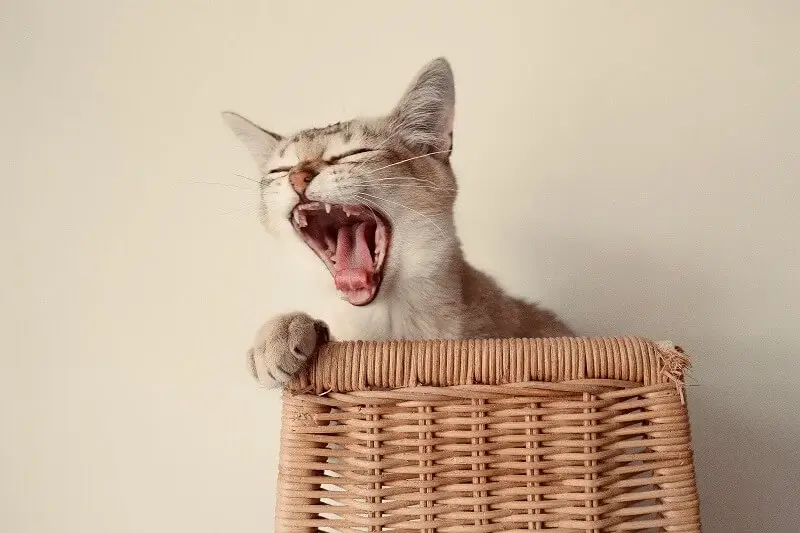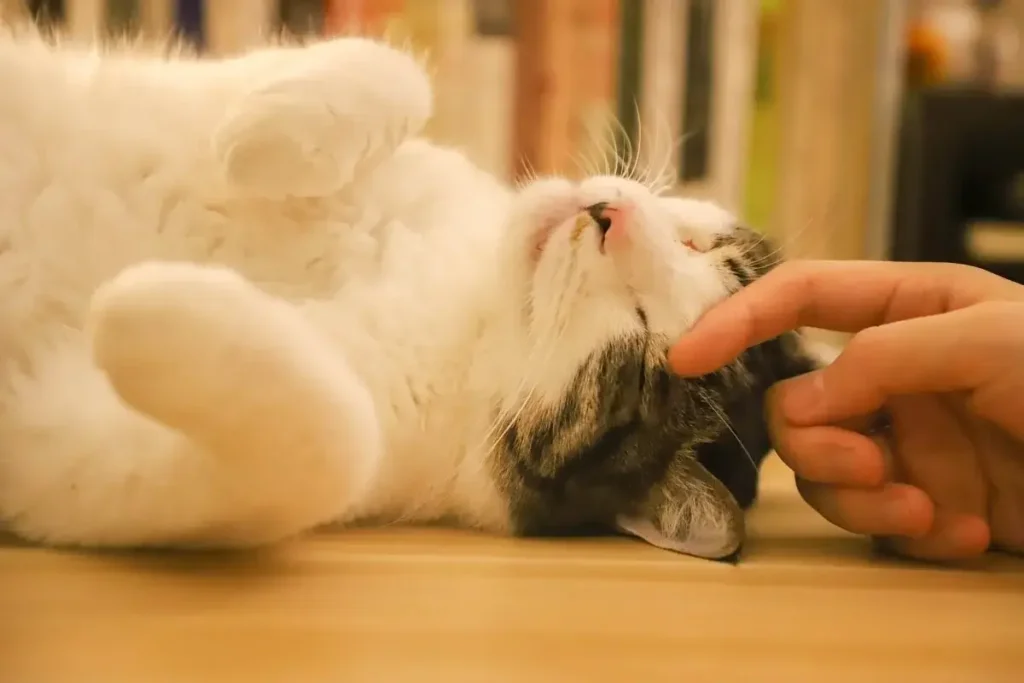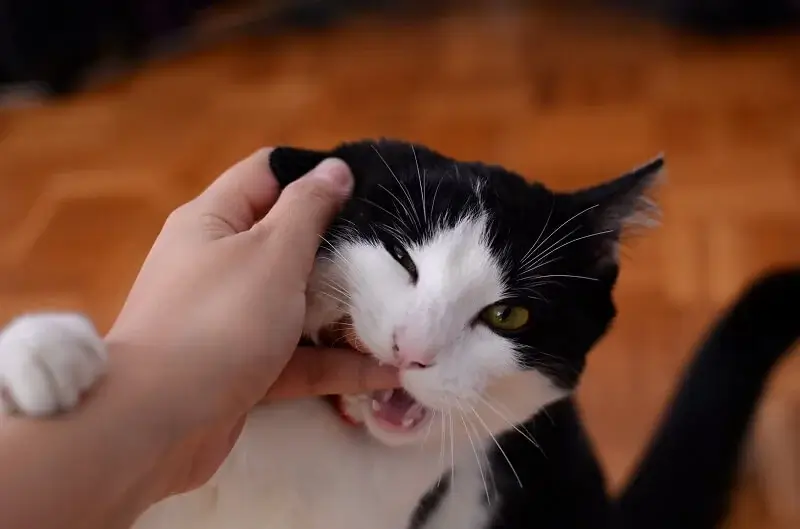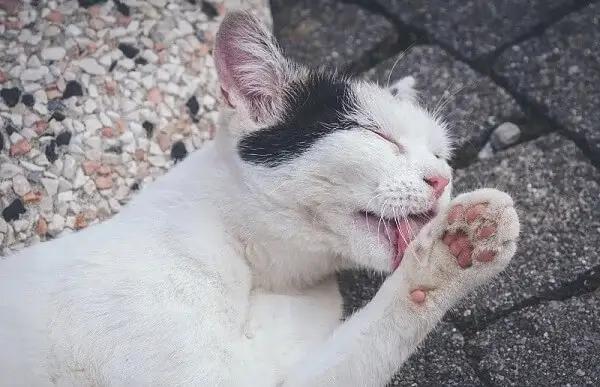Being bitten by a cat can be startling and even painful. But what does it really mean when your furry companion uses their teeth on you? Many of the people including me search for the answers what does it mean when a Cat bites you? Why does my cat bite me? And what to do when cat bites you?
I did a lot of research and also notice my kitty behavior to unfold the answer for you. Cat bites actually convey a variety of potential messages. it usually means they are playing, showing affection, feeling scared/stressed, or communicating some discomfort.
Therefore, it is key to know the exact meaning cats bite humans to interpret and respond appropriately to feline bites to understand your cat and reinforcing better behavior.

Reasons Why Cats Bite Humans
Generally, cats bite humans for many reasons. The context around the why cats bite humans provides clues into your cat’s motivation and meaning. Some common causes of cat bites include:
Playful Biting
It is often happening that Kittens and young cats bite humans while playing. It allows them to practice hunting skills. They may bite hands and feet as they ‘attack’. But play biting can continue into adulthood as well.
Cats may gently bite owners during play as ‘practice’ fighting. These bites are not intended to harm. They just signify your cat is enjoying playtime.

Petting-Induced Biting
According to purina, It’s not uncommon for cats to suddenly bite when being petted. Petting provides social bonding for cats. But if petting occurs past the point of enjoyment, the cat may give a little nip to say “enough!”. Cats can also become overstimulated and bite when petted too vigorously. Respect your cat’s boundaries if they indicate petting time is over.
Love Bites
It is common that cats form close social bonds with owners. Therefore, a gentle bite during cuddling or petting may be a sign of feline affection. Additionally, so-called ‘love bites’ are light nips that usually do not harm the owner skin. it simply means that your kitty cares for and trusts you.
But you need to beware of misinterpreting aggressive bites as love bites of your kitten. You need to also Look at other body language for clues like whether the ears are relaxed or tense. Love bites typically occur during calm interactions, not when the cat is excited or overstimulated.
Fear or Stress Biting
It is not compulsory that cat bites signs love every time, biting also results from a fearful or anxious cat feeling threatened. Because it is also noted that fearful cats may bite defensively when cornered or handled and stress can also cause redirected biting. So, if the source of stress cannot be accessed, the cat may bite a nearby human or animal.
Therefore, try to recognize and minimize environmental stressors that contribute to bites like introducing new people, loud noises or a disruptive home environment. Additionally, make sure fearful cats have access to hiding spots and elevated perches in peaceful areas.

Biting as Communication
I have also noticed that cats also bite as a means of communication. Nips may convey annoyance, overstimulation, or as a sign to cease an unpleasant activity like petting. Additionally, Cats also ‘bite speak’ during grooming sessions, using gentle bites coupled with licks to show affection.
Therefore, it is important to pay attention to the situation and your cat’s body language to better understand bite messages. For example, a tense, agitated cat with a wagging tail that nips are communicating differently than a relaxed cat that mouths your hand.
Redirected Aggression Biting
Aggression triggered by an external stimulus like another cat or animal can get redirected toward people. For instance, your cat may get in a spat with a neighborhood cat outside. But since the other cat isn’t present after coming indoors, all that adrenaline and aggression may get targeted at the nearest human.
Additionally, redirection typically involves sudden, unprovoked biting and is more severe. The best way to avoid redirected aggression is to prevent the initial trigger when possible. Slowly reintroduce the cat to the environment once they have calmed down to prevent future incidents.
Overstimulation Biting
Some cats bite to say “enough!” when overstimulated by petting, play or external stimuli. I have notice that my cat bite me to signal that she has had too much activity and needs calm. Moreover, Cats may also gently bite when overexcited and stimulated. Therefore, it is important for you to watch for signs like swishing tails, ears flat back or pupils dilating too wide to avoid approaching their thresholds for stimulation.
Medical Cause for Cat Biting
Underlying medical conditions can also trigger cat bites in some cases. Like humans, Cats can have dental pain, arthritis, ear and skin problems, neurological issues and other conditions that may cause changes in their behavior like biting. Additionally, cats with dementia may also bite unpredictably.
It equally important that you must visit nearest vet center to have a complete checkup of your furry friend. Ask your vet to thoroughly examine your cat if aggression develops suddenly to rule out illness.
What To Do when Cat Bites You
Cat bites, even playful ones, should always be handled properly:
- Clean the wound immediately with soap and warm water. Flush puncture wounds thoroughly. Apply antiseptic if needed.
- Watch closely for signs of infection like redness, swelling, heat and pus. Infections require prompt medical treatment. See a doctor at the first sign of infection.
- Note the circumstances around the bite. Was it during petting, play or unrelated? Identifying contexts helps make sense of the bite.
- Redirect undesirable bite behavior with distraction or by withdrawing attention. Say a firm “no” then ignore the cat or divert their attention with a toy.
- Make a vet appointment to rule out conditions causing pain, stress or aggression changes. Discuss behavior changes when they first emerge.
- Seek immediate care if you experience symptoms like fever, red streaks or limited mobility after a cat bite. Cat bites can cause serious infections.
How To Stop a Cat from Biting
If your cat is a repeat biter, take proactive steps to curb the behavior:
- Provide adequate outlets for playtime using interactive toys at least twice daily. Rotating toys keeps things interesting. This satisfies natural hunting needs.
- Learn to read your cat’s subtle body language signaling overstimulation or fear. Cease petting or handling when these signs emerge. Never punish a cat for biting, as it may increase their anxiety.
- Use deterrents like compressed air, water pistols or noise making devices to disrupt biting. Never hit your cat. The goal is to redirect their attention, not scare them.
- Address stressors in your cat’s environment causing fear or anxiety. Reduce noise, add hidings spots and increase their access to peaceful, elevated perches with outdoor views. Try calming pheromone diffusers.
- See your vet to check for medical problems causing pain or behavioral changes. Issues like dental disease, arthritis or ear infections may require treatment. Bloodwork can check for thyroid issues.
Although Specialized training can modify aggressive cat biting by addressing the underlying motivation. But applying the above guide you can stop a cat from biting. Additionally, you can consult an animal behaviorist for customized guidance if bites persist despite efforts.
Conclusion
Summing up the topic, I can conclude that cat bites can have many motivations and meanings. Although consistent biting should always be addressed, but occasional nips from content cats may just be part of feline communication. Therefore, you need to understanding your cat’s body language, bite contexts and causes allows you to respond appropriately. I have experienced and can say that with patience, environmental changes and veterinary guidance, cats and owners can live bite-free.


Leave a Reply